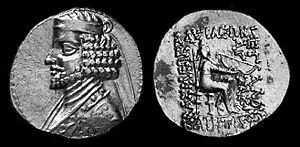- Orodes II of Parthia
-
 Coin of Orodes II from the mint at Seleucia on the Tigris. The reverse shows a seated archer with a bow. The Greek inscription reads ΒΑΣΙΛΕΩΣ ΒΑΣΙΛΕΩΝ ΑΡΣΑΚΟΥ ΜΕΓΑΛΟΥ ΚΑΙ ΚΤΙΣΤΟΥ (king of kings, great Arsaces, and founder).
Coin of Orodes II from the mint at Seleucia on the Tigris. The reverse shows a seated archer with a bow. The Greek inscription reads ΒΑΣΙΛΕΩΣ ΒΑΣΙΛΕΩΝ ΑΡΣΑΚΟΥ ΜΕΓΑΛΟΥ ΚΑΙ ΚΤΙΣΤΟΥ (king of kings, great Arsaces, and founder).
Orodes II of Parthia (also called Hyrodes Anaridius) ruled the Parthian Empire from 57 to 38 BC. Orodes was a son of Phraates III, whom he murdered in 57 BC, assisted by his brother Mithridates. He married a Greek Princess from the Kingdom of Commagene, called Laodice who was a daughter of King Antiochus I Theos of Commagene and Queen Isias Philostorgos of Commagene.
His brother Mithridates was made king of Media, but soon afterwards he was expelled by Orodes and fled into Syria. Thence he invaded the Parthian kingdom, but having reigned briefly in 55 BC was besieged by Surena, general of Orodes, in Seleucia on the Tigris, and after a prolonged resistance was captured and slain.
Meanwhile the Roman general Marcus Licinius Crassus had begun his attempt to conquer the east, but he was defeated and killed in 53 BC at the Battle of Carrhae by Surena, while Orodes himself invaded Armenia and forced King Artavasdes, the son of Tigranes the Great, to abandon the Romans. By the victory of Carrhae the countries east of the Euphrates were secured to the Parthians. In the next year they invaded Syria, but with little success, for Surena, whose achievements had made him too dangerous, was killed by Orodes, and Pacorus, the young son of the king was defeated by Cassius in 51 BC.
During the Roman Republican civil wars the Parthians sided first with Pompey and then with Brutus and Cassius, but took no action until 40 BC, when Pacorus, assisted by the Roman deserter Quintus Labienus conquered a great part of Syria and Asia Minor, but was defeated and killed by Ventidius in 38 BC. Orodes, who was deeply afflicted by the death of his gallant son, appointed his son Phraates IV successor, but was soon afterwards killed by him. Plutarch relates that Orodes understood Greek very well. After the death of Crassus the Bacchae of Euripides was presented at Artavasdes' court, with the head of Crassus himself allegedly being used as an accessory for a scene actually including a severed head, on the order of the king.
Orodes II of ParthiaBorn: Unknown Died: 38 BCPreceded by
Phraates IIIGreat King (Shah) of Parthia
57–38 BCSucceeded by
Phraates IVReferences
 This article incorporates text from a publication now in the public domain: Chisholm, Hugh, ed (1911). Encyclopædia Britannica (11th ed.). Cambridge University Press.
This article incorporates text from a publication now in the public domain: Chisholm, Hugh, ed (1911). Encyclopædia Britannica (11th ed.). Cambridge University Press.- Plutarch, Dio Cassius
Categories:- Parthian kings
- 30s BC deaths
- 1st-century BC Asian rulers
Wikimedia Foundation. 2010.
